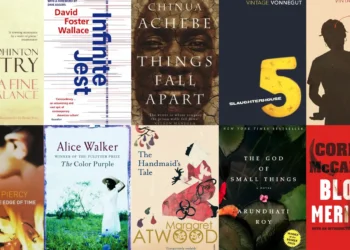Table of Contents
ToggleWhat is the feminist concern in Ice-Candy-Man
What is the feminist concern in Ice-Candy-Man-What is the character of Ayah and Lenny from the perspective of feminism?,What is the theme of feminism in cracking India?,What is the message of Ice-Candy-Man?,A story set against the backdrop of India’s 1947 partition, Ice Candy Man,also titled “Cracking India,” by Bapsi Sidhwa deftly blends feminist issues into its storyline. In order to examine the complexities of gender dynamics, power structures, and cultural expectations on women during a time of great societal upheaval, the novel goes beyond its historical and political elements and instead dives into the lives of its characters, particularly the female protagonists.What is the feminist concern in Ice-Candy-Man
Intersectionality and Identity:
The feminist discourse in “Ice Candy Man” revolves around the concept of intersectionality, particularly concerning the female characters. Lenny, the central character, embodies multiple layers of identity – as a woman, a Parsi, and an individual with a physical disability. Sidhwa uses Lenny’s experiences to examine how these intersecting identities shape her worldview and influence the challenges and opportunities she encounters. This approach challenges the notion of a uniform feminist experience, emphasizing the diverse ways women navigate societal roles.What is the feminist concern in Ice-Candy-Man
Patriarchal Structures and Societal Expectations:
A major feminist concern within the narrative is the pervasive influence of patriarchal structures and societal expectations on women. The partition intensifies existing gender norms, restricting the agency and autonomy of female characters. Enforced roles of women as caretakers, mothers, and upholders of cultural and familial honor become more pronounced during times of crisis. The character of Ayah, a Muslim woman working for Lenny’s family, exemplifies the struggles of women caught within traditional gender roles while contending with the disruptions brought about by the partition.
Also Read-
- Who is the narrator of Ice-Candy-Man
- How Ice Candy Man is a postcolonial novel
- What is the self alienation of Hagar in The Stone Angel
Sexual Violence and Exploitation:
The novel addresses the feminist concern of sexual violence and exploitation that women endure during periods of conflict. The partition results in a surge of communal violence, leading to the brutalization of women across communities. Female characters, including Ayah and the Ice Candy Man’s daughter, become victims of sexual violence, highlighting the vulnerability of women during societal breakdowns. The portrayal of sexual violence underscores the urgency of addressing issues related to women’s safety and agency during times of political unrest.
Female Solidarity and Resistance:
Amidst the challenges, the novel explores the feminist theme of female solidarity and resistance. Women in the story find strength in their connections, transcending religious and cultural boundaries. The friendship between Lenny and Shanta, the Hindu maid, symbolizes solidarity that defies societal expectations. The ability of women to empathize and support each other becomes a source of resilience, challenging the divisive forces at play during the partition.
Agency and Empowerment:
A central feminist concern in the novel is the quest for agency and empowerment in the face of adversity. Female characters navigate restrictive societal norms and actively seek ways to assert their autonomy. Lenny’s Aunt, a strong-willed and independent woman, challenges traditional expectations and becomes a symbol of resistance against oppressive gender roles. The pursuit of agency is also evident in the character of the Ice Candy Man’s daughter, who defies societal norms to pursue a relationship with a man from a different religious background.
Motherhood and Sacrifice:
The novel engages with the feminist concern of motherhood and the sacrifices women make for their families. Motherhood is portrayed as both a source of strength and vulnerability. Lenny’s mother, embodying the sacrificial mother figure, confronts the challenges of protecting her family in a tumultuous environment. The narrative interrogates the societal expectation that women must endure immense personal sacrifice for the sake of familial and cultural honor.
Education and Empowerment:
A feminist concern that emerges in the novel is the role of education in empowering women. Lenny’s pursuit of education, despite societal expectations and physical challenges, becomes a form of resistance. The narrative underscores the transformative potential of education in challenging traditional gender norms and providing women with the tools to navigate a changing world.
Ambiguity and Complexity of Feminist Experiences:
The novel excels in portraying the ambiguity and complexity of feminist experiences. It avoids presenting a simplistic or idealized vision of women’s struggles and instead acknowledges the nuanced ways in which women negotiate their identities, desires, and agency within the constraints of a patriarchal and tumultuous society.
Post-Partition Realities:
Feminist concerns extend into the post-partition realities depicted in the novel. Women grapple with the challenges of rebuilding their lives in the aftermath of violence and displacement. The novel interrogates how women navigate the complexities of identity and agency in the reshaped socio-political landscape.
Critique of Patriarchal Nationalism:
“Ice Candy Man” critiques the patriarchal nationalism often associated with nationalist movements. The narrative examines how women become collateral damage in the pursuit of political goals and how their bodies become battlegrounds for asserting cultural and religious dominance. This critique serves as a feminist lens through which readers can analyze the broader implications of nationalist ideologies on women’s lives.
Conclusion:
In conclusion, Bapsi Sidhwa’s Ice Candy Man transcends its historical context to offer a rich exploration of feminist concerns against the backdrop of the partition of India in 1947. Through a diverse array of female characters, the novel delves into the multifaceted challenges, complexities, and strengths of women during a time of profound societal upheaval. The feminist themes of intersectionality, patriarchy, sexual violence, female solidarity, agency, motherhood, education, and post-partition realities intricately weave together, providing a nuanced understanding of the ways in which women navigate their identities and struggles within the tumultuous landscape of historical and social change.What is the feminist concern in Ice-Candy-Man
FAQ:
1. What is “Ice Candy Man” about?
“Ice Candy Man,” also known as “Cracking India,” is a novel by Bapsi Sidhwa set against the backdrop of the partition of India in 1947. The narrative explores the lives of its characters, with a particular focus on the female protagonists, and delves into feminist concerns amid the historical and political turmoil.
2. How does the novel address intersectionality?
The novel addresses intersectionality by portraying Lenny, the central character, as a woman, a Parsi, and an individual with a physical disability. Through Lenny’s experiences, Sidhwa examines how these intersecting identities shape her worldview and influence the challenges and opportunities she faces.
3. What feminist concerns are explored in the novel?
The novel delves into various feminist concerns, including the influence of patriarchal structures, societal expectations on women, sexual violence and exploitation, female solidarity and resistance, the quest for agency and empowerment, motherhood and sacrifice, the role of education in empowering women, and the complexities of post-partition realities.
4. How does the novel depict female solidarity?
The novel depicts female solidarity through the relationships and connections formed by women across religious and cultural boundaries. The friendship between Lenny and Shanta, as well as other instances in the narrative, symbolizes the strength and support women find in each other during times of upheaval.
















